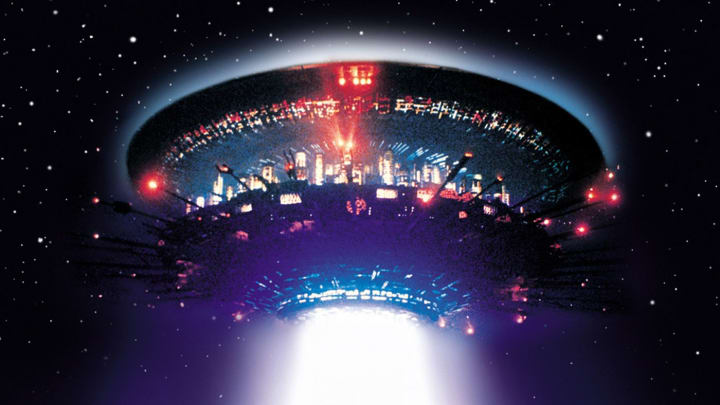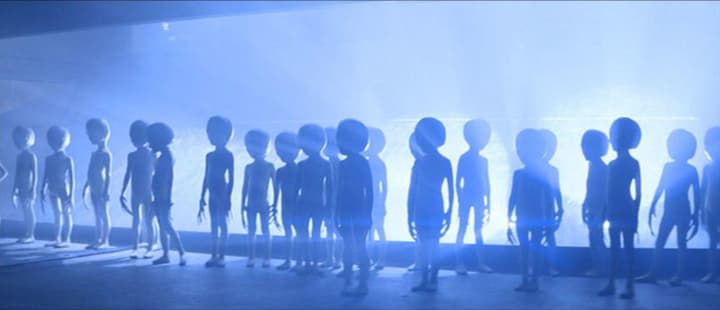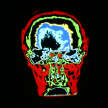Claire Evans on Sci-Fi, Aliens & Music
Claire Evans explores the connection between science fiction and music. Do you aliens listen to rock and roll?
In light of all of this cross-pollination, musical/science fiction I thought that I would talk to you about the relationship between science fiction, music – music and the future.
When the alien ships descend on Devil's Tower in the culminating scene of Steven Spielberg's classic 1977 movie close encounters of the third kind-the usual trappings of alien invasion are conspicuously absent. There's no laser guns, there's a pronouncement of interstellar warfare. The aliens don't unroll some cosmic decree claiming Earth and all of its resources. Instead they make contact with a melody, which I'm sure you're all familiar. And with the help of a Harp 25 synthesizer the human welcoming committee sings that melody right back. This establishes not only a line of communication but goodwill between two species. The synthesizer brings together its literally synthesizes a cosmic gulf.
Music like mathematics is often considered to be a kind of universal language, and this has some basis in science. The human brain hums with complex rhythms that are generated by signals pulsing from neuron to neuron, and we are just art and learn now that these rhythmic oscillations have a hand in all manner of cognitive functions, from memory to motor skills, information transfer perception; and music affects the limbic system is a relatively ancient part of the human brain and one that we share with much of the animal kingdom.
But what about beyond the animal kingdom? What about beyond this planet? Is music really a useful vehicle for communicating across an interstellar intelligence gulf? We've exploited this belief in fiction and reality alike. Close encounters of the third kind's tonal hello is an example as is NASA's golden record, which was tacked onto the Voyager probe in 1977 and is kind of a musical mix tape of messages from Earth, everything from Chuck Berry, to boxspring and bird Concerto.
It is likely that aliens would take the Voyager golden record as a piece of space garbage. Even Carl Sagan-this is a deeper cut Star Trek reference-even Carl Sagan who orchestrated the project called it a symbolic statement rather than a serious attempt to communicate with extra-terrestrial life.

He was right the idea that music ranks as a kind of universal language is predicated along far too many false assumptions. One, the assumptions that aliens would've evolved along the same lines as us with a built in apparatus for translating frequencies into meaning. Any assumption that we make about the physiognomy of alien life it is flimsy. We have no evidence to prove that parallel evolution would work on interstellar scale, say the diversity of ears and eyeballs on earth; but even on earth not all life follows on the same path. Elephants hear with their giant ears, but reptile sense transmissions or messages through the ground through feeling vibrations in their bellies. Dolphins hear with the kind of ear drum underneath the side of their heads, and bats echo locate in the blind. Whales communicate using complex moans and clicks, incidentally the Voyager golden record sent Whale songs into space so who knows.
If extra-terrestrials do by some stroke of luck actually recognize frequencies as information then we are still left with a far bigger problem of aesthetics and meaning. With our music with its impossibly wide tonal variations be pleasing to an alien ear? Would it contain any meaningful information? Just as dolphin clicks are inscrutable to us might the Brandenburg Concerto be an offensive speech to the far more refined palate of the alien ear, or might the repercussions be far more sinister?
That said if aliens are interested in us they have plenty of source material.
And this garble could tell an intelligent race far more about us than we might realize or be comfortable with, just as a perusal of your own and edited search history reveals a very clear form of personhood, your fears and desires, to say nothing of the limits of your intelligence. So could our unintentional transmissions tell an alien race a great deal about us; and it's not necessarily flattering. In Carl Sagan's, I don't know if you guys knew that was the opening credits of contact which is based on Carl Sagan's novel and adapted into a movie in 1997 by Robert***. Anyway in contact aliens may contact with the human race by bouncing back the first signal strong enough to escape our planet's ionosphere – Adolf Hitler's opening speech from the 1936 Summer Olympics, awkward.
But even our intentional messages the ones we send out into space with the intent of being received, those don't necessarily work much better either, because they might travel to the universe for millennia, we might not even be around by the time that the golden record or radio transmissions or any other oral emissions reach their intended recipient; and even if we are by some miracle we haven't destroyed our planet and everything with it, we will definitely have made evolutionary leaps in both the composition and the understanding associated with music. I mean consider the difference the Incan pan flutes and***. And that's only 1000 years of relatively event less human history.

Which leads us to the essential question that I want to raise here, is it possible to future proof music? To create something that is timeless not just for a couple of generations but for the entire span of the human race, something which can express our sentiments our intelligence our culture, the fact that we existed to the eternal audience of the cosmos. The simple answer to this question is no I don't think so, because if you look at any science fiction movie where music from future is portrayed from the***seen in Star Wars or the ill-fated***sequence in the matrix reloaded movies, it is never very futuristic at all. When we are tasked with creating something that might reasonably seem to be composed from the future we always fail because science fiction tells us so much more about the present and it does about the future and its costuming and larger themes.
Musical trends are ephemeral and they are a very short half-life, I think that archaeologists from the future could very easily carbon date found documents from human history just by examining musical sequences in our science fiction films for example, this scene from the classic Star Trek episode return to Eden could not have been filmed in the late 60s.
It is like unbelievable.
I mean that's the late 60s trap and burn no one could ever doubt it. But since we are engaged here in a thought experiment it does consider the question, what does internal music sound like? It can't contain language because language berries far too quickly from place to place, from country to subculture, from moment to moment in time. It can't be composed in a recognizable scale on instrument scale or Western scale, because that positions it to a certain part of our own planet. Can it even be beautiful, or is beauty something that is too closely wired to our newer chemistry? To the tones that soothe our brain and summon stored objective emotional memories to our awareness.
Beginning with Pythagoras the engines often wrote of a musical universalist or music of the spheres, the idea that the movements of celestial bodies had a kind of musical although inaudible relationship, a harmonic religious mathematical quality. The concept underlies all of Kepler's writing about their bodies and Plato considered music and astronomy to be twin fields. Astronomy for the eyes and music for the ears.
A little-known by product of the NASA Voyager missions is a set of recordings the relationship between the magnetosphere of certain planets and the solar wind. NASA released this five disc set called the symphonies of the planets which is what you are hearing now. It has all the qualities of an ambient drone that we would call it music is a particularly deaf act of anthropomorphism. It is actually just the data represented as sound.
If I had to guess I was in the closest we could come to future proofing music would be to create single tones generated precisely by machines. Internal music might just be a representation of the fact that we have the intelligence to identify and the capacity to re-create discrete slices of the resonance spectrum. Of course this is a catch 22 because the antithesis is of music is to ordinarily define it. It would not be pleasing to listen to and speak at all to the emotional reality of being a human being. As in any fine art music is defined by its subjective qualities and those can't really be quantified. What counts about music can't be counted.

The only thing separating this future proof music that I am describing from pure mathematics or physics is really just the organ that we use for intake the ears rather than eyes, with the intended recipient of being the mind. And yet the idea of objective music does kind of linger in our imaginations of the future. In the sort of electronic music that is associated with science-fiction, every science-fiction or rather most science-fiction movies have primarily electronic soundtracks of forbidden planets which have the first electronic score to be switched on***. The fact that Steven Spielberg composing a sound that we could use to communicate with aliens in Close encounters that he would use a wave oppose something else is fairly significant. Because we can't really imagine an extra-terrestrial strolling down the ramp from his craft strumming a slight key guitar, because it is always possible like anything that happens hasn't happened yet, it is not common in the science-fiction that we make because analogue instruments are on a perpetual journey towards entropy. They are too likely to generate tones that shading to one another and are not precise. The future is nothing if not precise in our minds. It is a time in our imagination when margins of error have been nudged into obscurity.
That said I do believe that the music of the future will be electronic in nature and not because electronic music is more fundamentally futuristic or has a more one-to-one relationship with sound input or even that it avoids ambiguities of analog sound, but because the ears of the future will likely not be entirely human. In this presentation I have so far ignored of those other intelligences with whom we might use a universal language like music to communicate; not alien minds but artificial minds that we create.
There are many people that believe in the technological singularity, a moment in time when technological artificial intelligence will lap our own, breaking open the barriers of biological limitation. Regardless of whether or not we have all signed off on this idea there are hundreds of teams of people working from research labs, armies, nations working very diligently on this idea, developing for the future.
It is inevitable to a certain extent we need cheaper, smaller, faster minds of our own to run the world. And in our lifetime we will see the blossoming of new artificial intelligences with their own drives and abilities will quickly leap beyond their original programming. It is even possible they will develop self-awareness or process indistinguishable from it. Further it is possible that artificial intelligence will be many ways distinguishable from the minds it has been designed to enhance. It may become quite difficult to objectively place a line between human and artificial minds, we are after all already cyborgs carrying around our dreams and ideas and devices that we hold our hands at any moment.
As we move toward synthesis with machines extending the range of our senses and altering fundamentally the capacities of our minds, it is certain that our taste will change, that our media will change is already changing, will lose tolerance for the written word by the day as we gain tolerance for the collective mind.
Perhaps someday we might develop a taste for the music made by machines.
The artificial intelligences of our relatively near future will have unfettered access to all of the cultural products of human history, they will share DNA, the same languages, algorithms with electronic music. They will have network relationships with thousands of devices and systems capable of generating sound and free from the limitations of the human body there is no doubt that they will be expert players, in fact not even need to play at all. After all we used to take a needle, a magnet or a laser to re-create sound, but now all it takes is code.
We've come a long way since then. Machines can outperform and compose at a higher caliber than ever before, the very beautiful panel piece we are listening to now is composed by piece of software called Emily Howell, an outdated version of the composer and computer scientist David copes***experimented of these intelligence. But such music as beautiful as it is is based on parameters set by human users and programmers. We can be certain or sure if artificial intelligence will ever write on its own volition with its own aesthetic judgments in a true sense. But artificial intelligence is like big surprises at every turn in its complexity, and scope, and in its capacity for beauty.
This is moon shot speculation as is everything you will see tonight, but if music is a form of communication and is indeed a kind of universal language, then machines might become involved not only with its composition but more importantly with its appreciation, and if that is the case do you think the income pamphlets, they***Concerto, the***know they will likely create a sound that is different from anything that we have ever heard.
The 19th century for writer***only wrote one proper science-fiction story called the color out in space about an asteroid that crashes to earth and brings with it a color that is impossible to really identify fully perceived by human eyes, in fact it is only by analogy that anyone can really understand it as a color at all. It drives everyone who looks at it mad. The color is "a frightful messenger from unformed realms of infinity beyond all nature as we know it, from realms whose mere existence***numbs us with the black extra cosmic gold it was before our friends and eyes." in the end it lays weight from the countryside and shoots back up into space unknown and unknowable.
The music composed by extra artificial intelligences might have a similar quality. It might disrupt the delicate electrochemical rhythms of the human brain, and as a messenger of meaning for two unfamiliar to understand it might be seemingly random mathematical, like the music universal it might not be audible at all, it might be simply the Symphony of pure data, or like love crafts color you might only be able to decipher it by analogy. And although the need for such analogies is distant yet, it would serve us well to start thinking about them now.
In the end music might be a universal language, but if we are too proud to learn its new dialects you will find ourselves silent and friendless in a foreign future.

Do Aliens Listen to Claire Evans' YACHT?
Claire L. Evans is a woman of many talents. She is a prolific writer, a talented singer, an avid fan of science fiction and an all around creative artist. Though currently based in Los Angeles, Evans was born in Swindon, United Kingdom in 1984. A former editor of the online sci-fi magazine Omni Reboot, her articles have encompassed a wide range of topics that demonstrate that the wheels of her mind are constantly turning and producing thought provoking material. This is evident in her music as well. Perhaps when aliens do tune into a little american music culture, Claire is on the playlist.
Evans, along with Jona Bechtolt, make up the pop duo YACHT. YACHT stands for Young Americans Challenging High Technology. She has recorded two albums, See Mystery Lights and Shangri-La and appears as a guest on the third album, I Believe in You. Your Magic is Real. The New York Times has referred to her as a "neo-Annie Lenox" and she has been well known for her androgynous onstage persona; not always a woman's woman, but a woman of mystery and fluidity. In a 2010 interview when asked about the messages that YACHT's music sends and how fans perceive them, Evans said, "We don't have expectations..if you enjoy YACHT on a pop-dance music level and don't want to explore the underlying thematic elements, that's fine to me. That's one valid way of enjoying the band." YACHT's message was the hope of combining underground musical culture and an underground spiritual culture. According to Evans, "There are a lot of parallels between charismatic religious leadership and charismatic underground music leadership."
Known for out of the ordinary eccentricities in their music, YACHT had released a single titled "Party at the NSA." It is a satirical protest about the unwarranted surveillance by the government and they put it up themselves. The money made from the single were going to the Electronic Frontier Foundation-a non-profit that litigates on behalf of the public interest against the NSA and other corporations. Evans does not less the grass grow under her feet, she is constantly doing things against the grain to get her message heard. This is even more obvious in her writing.
In a 2015 interview, Evans discussed how she feels about the evolution of technology and how it combines with every aspect of what she does. "Technology is just a tool. The hammer, the camera, the wheel: these were all just tools, too. How we use them is up to us. On some level, I think it's my life's work to find ways to leverage the power of the particular technologies dominating the landscape of modern life...The synergy of music, art and technology is not only possible, it is happening everywhere all the time. It just depends on your definition of art. Bands now have to be artful in their use of technology, both in the creative process and in the more complex process of sharing and articulating their work in the public sphere. As do artists, and, as it turns out-literally everyone on the social web, managing, for better or worse, their personal brands. This is the Wild West of identity."
Evans, who has been referred to as a science journalist, has written many science fiction pieces as well and has a science and culture blog. According to her Wikipedia page, her essay for "Moon Art: Fallen Astronaut" was anthologized in The Best Science Writing Online 2012. She is the co-author of New Art/Sciences Affinities, a book which is about contemporary artists working "at the intersection of science and technology."
About the Creator
Futurism Staff
A team of space cadets making the most out of their time trapped on Earth. Help.






Comments
There are no comments for this story
Be the first to respond and start the conversation.